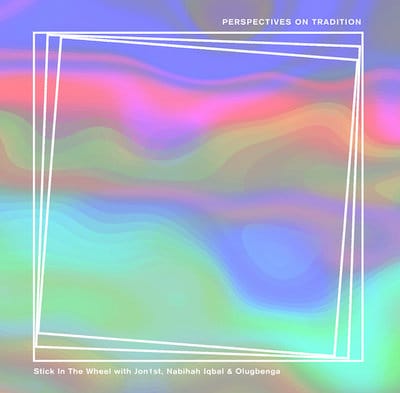
Stick in the Wheel
Perspectives on Tradition
From Here Records
2022
On one level, Perspectives On Tradition does exactly what its title implies. Stick In The Wheel (Nicola Kearey and Ian Carter) asked three contemporary musicians to explore their own heritage and that of the UK’s traditional music scene via the archives at Cecil Sharp House, with a view to collaborating on a handful of tracks. Nothing too groundbreaking there, you might think. But if you know the music of Stick In The Wheel, you will know that pretty much everything they do is groundbreaking, often bordering on iconoclastic. While their music has roots – or at least tendrils – in folk, their philosophy is a heady blend of radical inclusivity and punky anarchy. The resulting music is often as diverse as it is exciting.
So, where does Perspectives On Tradition fit into their boundary-pushing ethos? Well, you only have to look as far as the collaborators. Jon1st is a DMC scratch champion, Nabihah Iqbal is a DJ, broadcaster and lecturer who has worked with artist Wolfgang Tilmans at the Tate, and Olugbenga is a Nigerian singer and producer who also happens to play bass in indie electro-pop darlings Metronomy. These aren’t necessarily the kind of musicians you would expect to collaborate on an EP of traditional English song. And that’s the point. Stick In The Wheel have always been interested in the inclusive potential of folk music and keen to rail against all that is stuffy, reductive and undemocratic within the genre. Gatekeepers are often able to hide in plain sight in folk; Stick In The Wheel make music that very deliberately breaks down those gates.

Gatekeepers are often able to hide in plain sight in folk; Stick In The Wheel make music that very deliberately breaks down those gates.
They are keen to stress that tradition takes many forms: scratching and sampling are just as worthy of the term as jigs and reels. The tradition of using computers to make music (a democratising movement within music as a whole, if ever there was one) is just as important as that of using acoustic instruments or singing unaccompanied in folk clubs or passing down songs from one generation to the next. This recognition that tradition is permeable and malleable by nature informs all six songs here. Opener The Milkmaid is a song about a woman’s predicament sung (in this instance by a woman) from a male viewpoint. Nabihah Iqbal’s experience as a producer seems to inform the song’s downbeat backdrop of melancholy keys, while Kearey’s vocals are pushed front and centre to emphasise the song’s lyrics. It’s a song with all the ebb and flow of a good argument.
Iqbal’s second contribution is Farewell He. Where The Milkmaid feels like it documents the beginnings of a potentially disastrous relationship, Farewell He could be that same relationship’s final moment. Drawn out over eight and a half minutes and with something of the hauntological psychedelia of Alison Cotton’s most recent album about it, it is full of strange echoes, brooding electronica and dubby bits and bobs. Both of Iqbal’s choices were inspired by her reading of Thomas Hardy’s Tess of the D’Urbervilles – ‘songs that come from the Dorset area, about girls or women being messed about’, in her words. These are songs about problems in society – in this case, problems caused by perceived gender roles – and what really hits home is how contemporary these problems are.
Both of Jon1st’s songs come, in different ways, from his home county of Leicestershire. The first is a version of The Ballad of Black Annis, a poem by John Heyrick (husband of the abolitionist Elizabeth Heyrick and descendant of poet Robert Herrick). It is a spooked slice of electro-folk, with Kearey’s voice cut up and processed to a wonderfully eerie degree. It also carries a genuine message about the persecution of the outsider and the misunderstanding of the other that has persisted throughout history. Let No Man Steal Your Thyme is composed of vocal samples taken from a Leicester folk club, while the musical arrangement, with its skittery, modernist dance beats, would be more at home in a nightclub than a folk club. It isn’t incongruous though, or if it is, then it’s the incongruity that makes it all the more thrilling. This is what Stick In The Wheel are trying to get at: everything is possible and nothing is sacred.
Olugbenga also plunders dance music’s tropes for inspiration. He brings along a spoken-word piece – a folk-tale called Devil In The Well – and augments it with euphoric vocals and pulsing beats. It is backed up by a wonky, wobbly version of Bright-Eyed Boy that feels like a kind of musical time-slip.
The final track’s title is Euphoric Clashes, which is a term that could easily be ascribed to the whole release (it is also, handily, an anagram of Cecil Sharp House). Kearey and Carter created the track’s basic form, and the other three artists contributed individual parts to it. The result is one of the most experimental, diverse, politically resonant and frankly beautiful tracks ever to come out under the banner of folk music. It begins with skeletal keys and the quiet clutter of background noise before a dark sheen of electronics begins to engulf it. There are beats, space-age blips, and a guitar solo. An insistent, simple melody imposes itself before Kearey begins reading a list of names. These names are the people from whom the songs used on this record were collected. People who are often marginalised or completely forgotten in favour of the collectors themselves. It is strangely moving, but it is also radical – essentially, it posits a new way of archiving folk songs, a fairer, better way that gives credit where it is due.
These final moments help us understand what Perspectives On Tradition is about. Like much of Stick In The Wheel’s work, it functions as a chapter in a manifesto for how folk music should be made and how tradition should be thought about. But it never feels cloistered by its own ideas. Because Kearey, Carter and their collaborators are fearless when it comes to following their own standards, the results are rarely short of astonishing.
Order Perspectives on Tradition: https://stickinthewheel.lnk.to/PerspectivesOnTradition
https://www.stickinthewheel.com/
